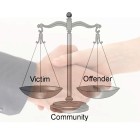Judge Hatchett Keynotes Conference
|
The Truancy Intervention Project will host a conference sponsored by the Governor’s Office for Children and Families. The event has a long name: Charting the Course: Reinvesting In and Reengaging Georgia’s Youth. The conference runs Oct. 27-29 and features a keynote speech from former Fulton County Juvenile Chief Judge Glenda Hatchett, now star of the “Judge Hatchett Show.” Registration is free, but limited to 200 people. The event is almost half full so sign up here.




